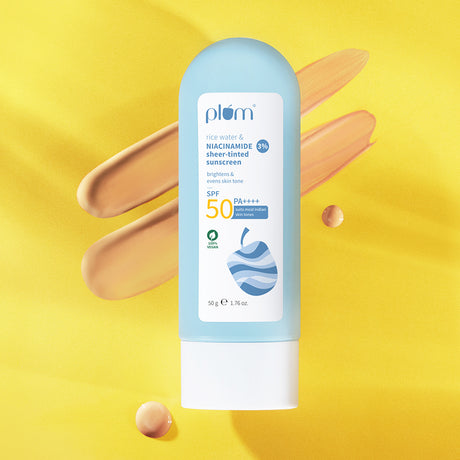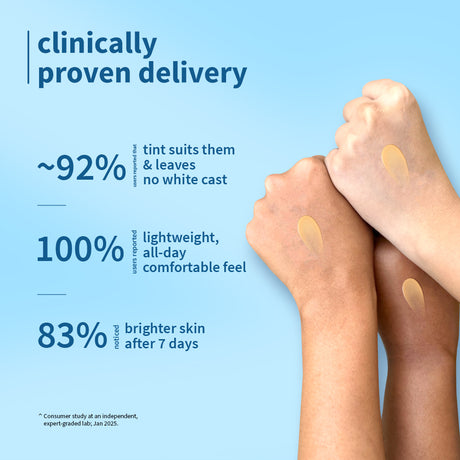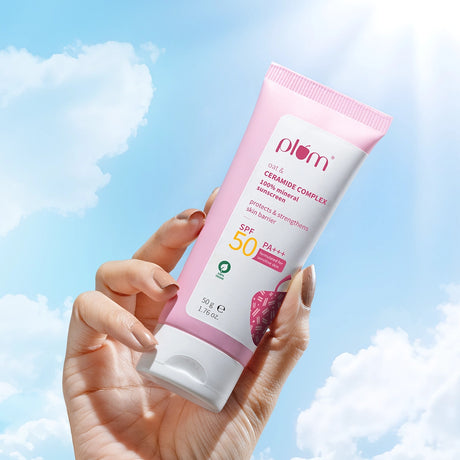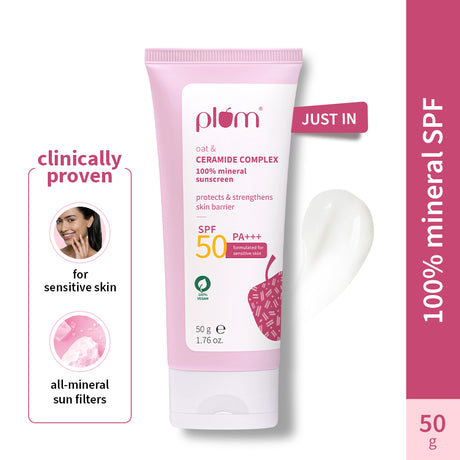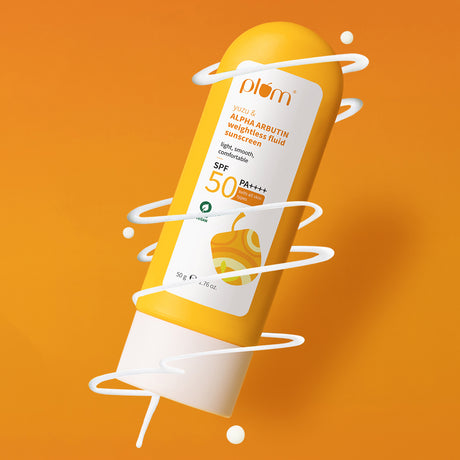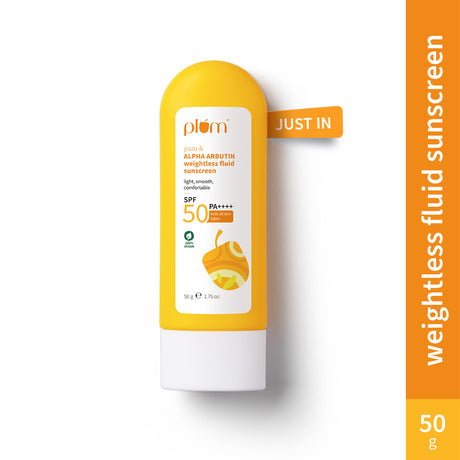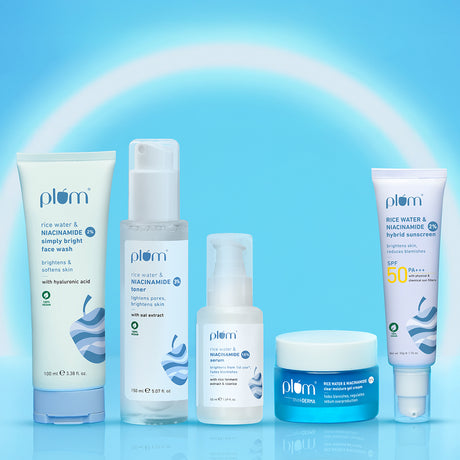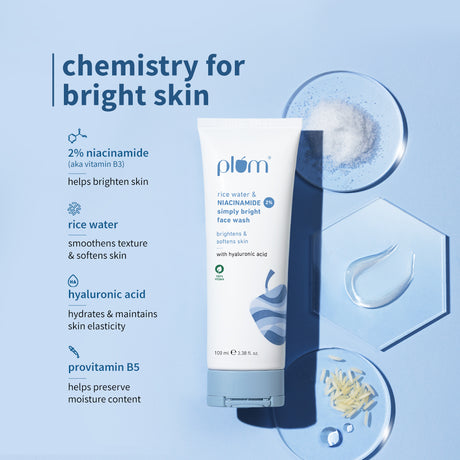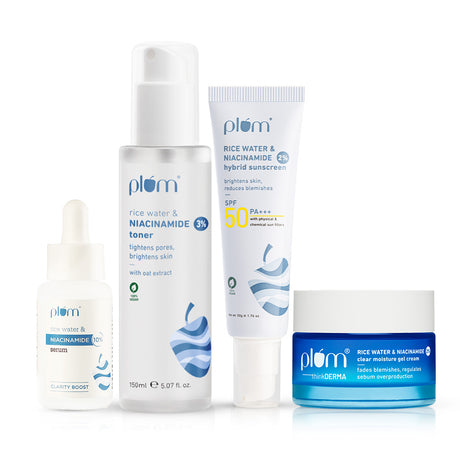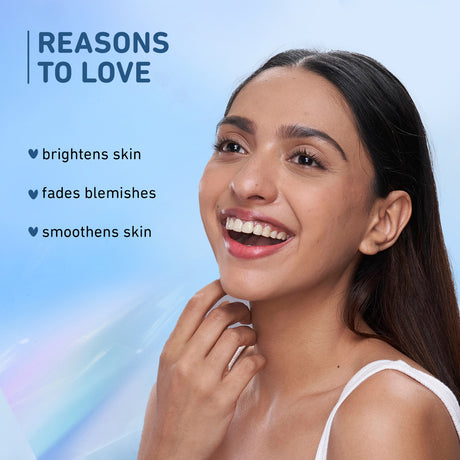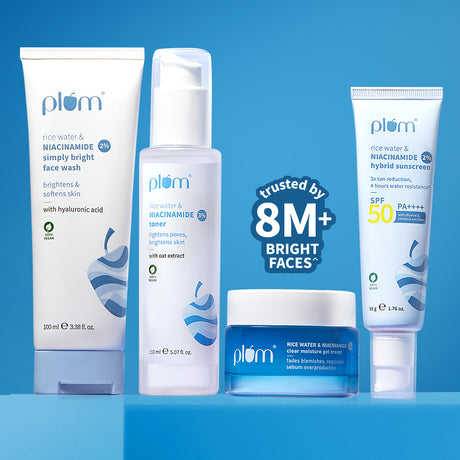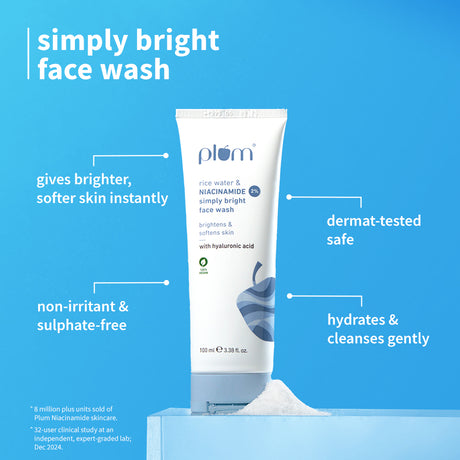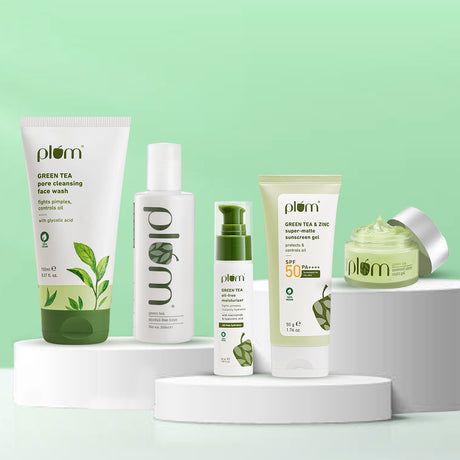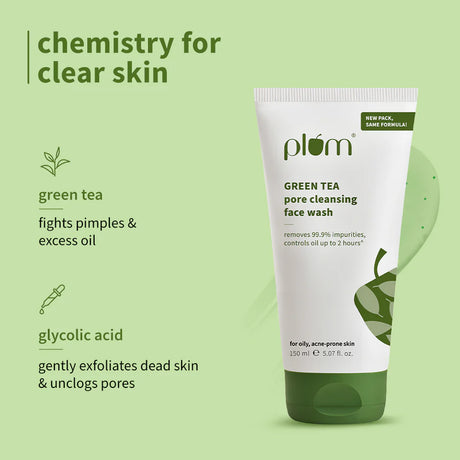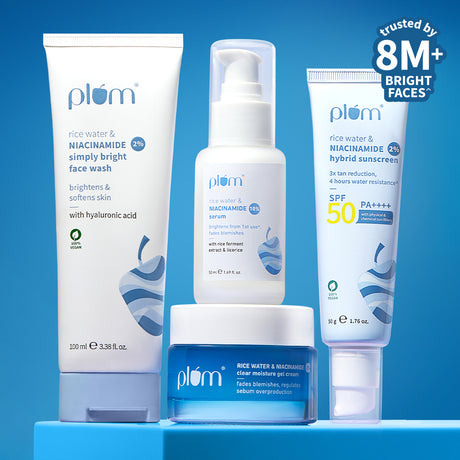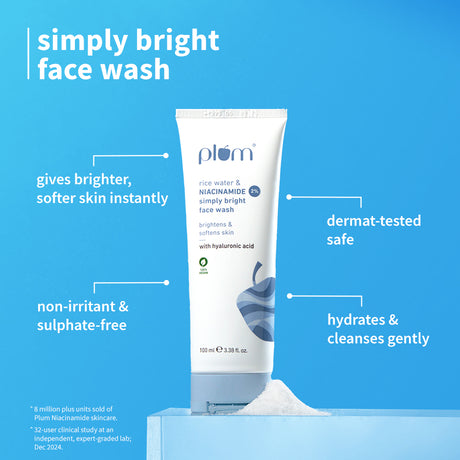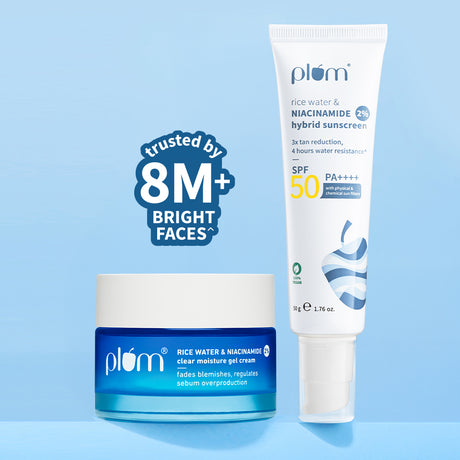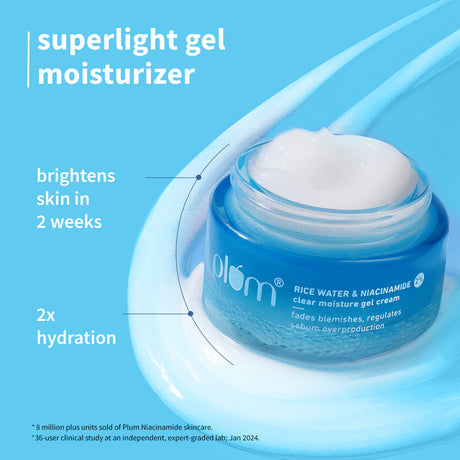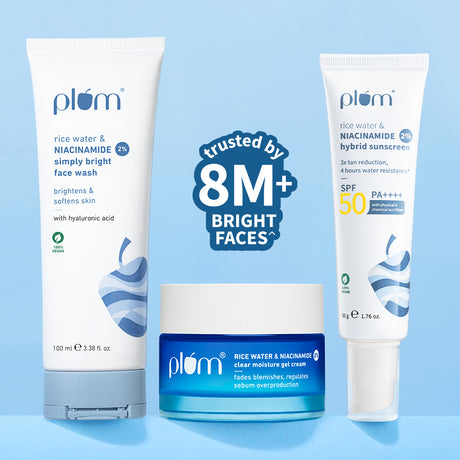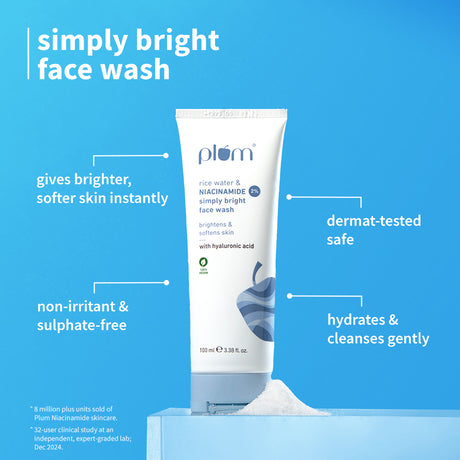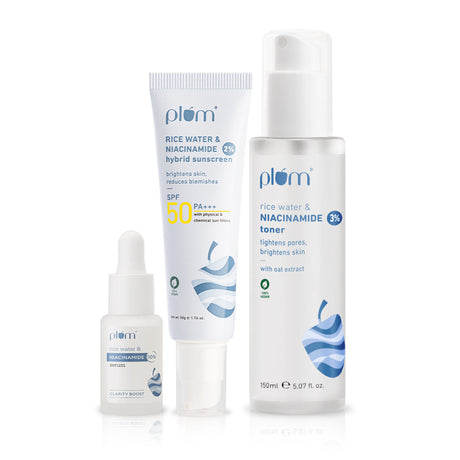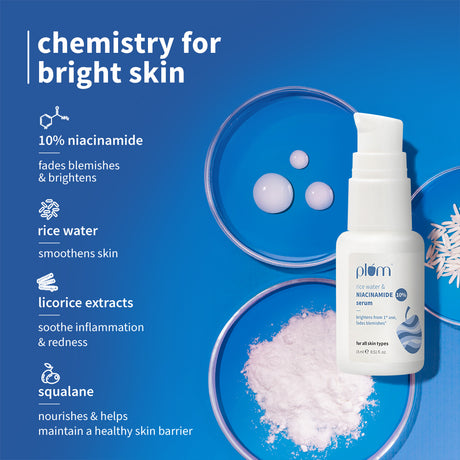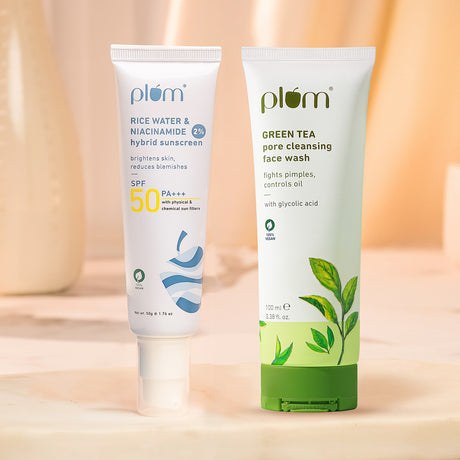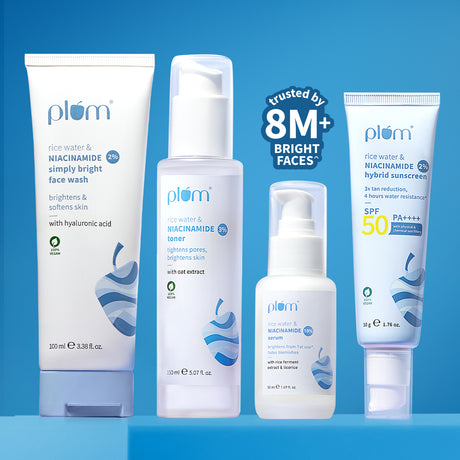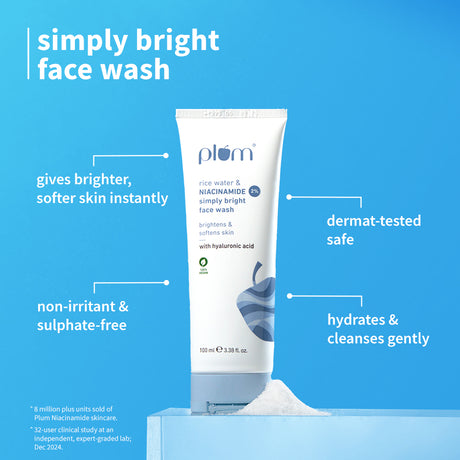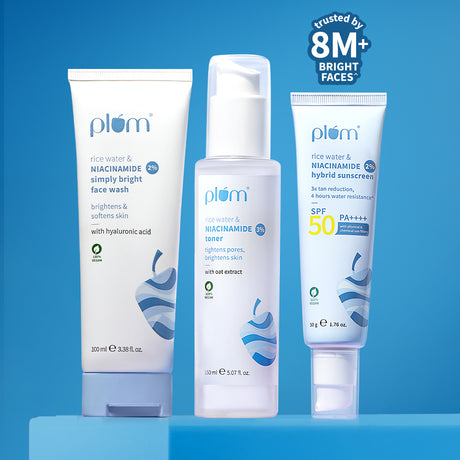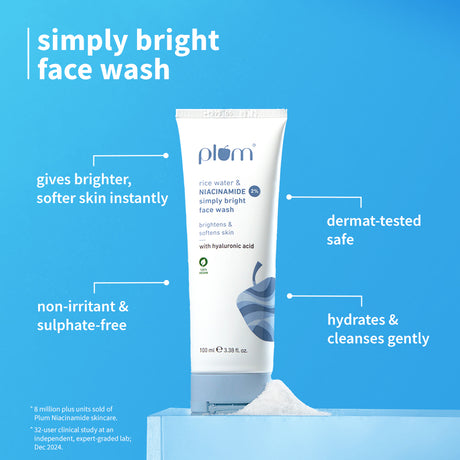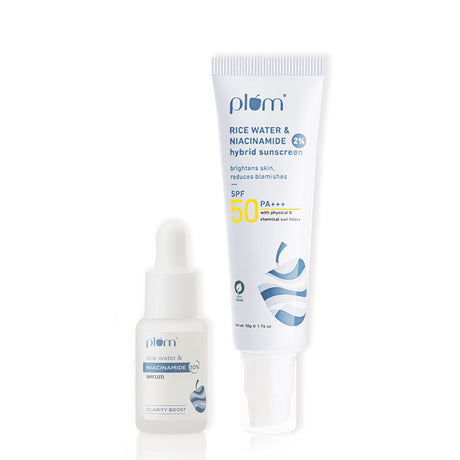-
2% Niacinamide Sunscreen & Rice Water SPF 50 PA++++ Sunscreen
In-vivo & in-vitro tested | non-comedogenic | 4-hr water resistant
all skin types₹509.00₹599.00(15% off)Unit price /Unavailable -
Green Tea & Zinc Super-Matte SPF 50 Sunscreen Gel for Oily Skin
Instant Oil Reduction| 120-min Water Resistant | Dermat-Tested | No White Cast
oily acne-prone combination skin14% off₹365.00₹425.00(14% off)Unit price /Unavailable -
3% Niacinamide & Rice Water SPF 50 Sheer-Tinted Sunscreen
Universal Tint for Most Indian Skin Tones | Non-Greasy
all skin types14% off₹429.00₹499.00(14% off)Unit price /Unavailable -
Plum Oat & Ceramide Complex 100% Mineral Sunscreen
SPF 50 PA+++ | No White Cast | For Sensitive Skin | Gynaecologist & Pediatrician Trusted | Strengthens Skin Barrier | Lightweight, Non-Oily | Men & Women | 50g
all skin types14% off₹601.00₹699.00(14% off)Unit price /Unavailable -
Yuzu & Alpha Arbutin SPF 50 Weightless Fluid Sunscreen
Helps Fade Tan & Dark Spots | Ultra-light Texture | 50 gm
all skin types14% off₹429.00₹499.00(14% off)Unit price /Unavailable -
Squalane & Vitamin E SPF 50 PA+++ Dewy-Bright Sunscreen
Safe, New Gen UV Filters | No White Cast
all skin types14% off 20% off₹429.00₹499.00(14% off)Unit price /Unavailable -
Cica & Hyaluronic Acid SPF 50 Sunscreen
Safe, New Gen UV Filters | Non-Sticky| Non-Oily
all skin types14% off 20% off₹343.00₹399.00(14% off)Unit price /Unavailable -
Niacinamide Bright & Clear Skin Combo | Face Wash, Toner, Serum, Gel Moisturizer & SPF 50 PA+++ Sunscreen
Brightens Skin | Fades Blemishes | Smoothens Skin Texture | For All Skin Types
all skin types₹1,884.00₹2,512.00(25% off)Unit price /Unavailable -
Niacinamide Clear & Bright Skin Combo | With Niacinamide & Rice Water | Toner, Serum, Gel Moisturizer & SPF 50 PA+++ Sunscreen
Brightens Skin | Fades Blemishes | Smoothens Skin Texture | For All Skin Types
all skin types₹1,517.00₹2,023.00(25% off)Unit price /Unavailable -
Niacinamide & Rice Water CTMS Combo | Face Wash, Toner, Moisturizer & Sunscreen
Brightens Skin | Fades Blemishes | Tightens Pores | SPF50 PA++++
₹1,247.00₹1,663.00(25% off)Unit price /Unavailable -
Green Tea Goodbye Acne Combo
Fights Pimples | Unclogs Pores | Tightens Pores | Hydrates & Protects
oily acne-prone combination skin₹1,687.00₹2,250.00(25% off)Unit price /Unavailable -
Niacinamide & Rice Water Brightening CSMS Combo
Brightens Skin | Fades Blemishes | Smoothens Skin | SPF50 PA++++
₹1,554.00₹2,072.00(25% off)Unit price /Unavailable -
Niacinamide & Rice Water Moisturize & Protect Combo
Brightens Skin | Fades Blemishes | Smoothens Texture | SPF50 PA++++
₹739.00₹924.00(20% off)Unit price /Unavailable -
Plum Bright Years All-Day Defence SPF 50 PA++++ Sunscreen
Anti-aging sunscreen |UVA & UVB protection
Mature Skin14% off₹752.00₹875.00(14% off)Unit price /Unavailable -
Niacinamide & Rice Water Brightening CMS Combo
Brightens Skin | Fades Blemishes | Hydrates | SPF50 PA++++
₹978.00₹1,223.00(20% off)Unit price /Unavailable -
Niacinamide Bright Skin Trio | With Toner, Serum & SPF 50 Sunscreen for Bright Skin new
Fades Blemishes & Smoothens
all skin types₹950.00₹1,188.00(20% off)Unit price /Unavailable -
Cleanse & Protect Duo For Oily Skin | Green Tea Pore Cleansing Face Wash 100ml | Rice Water & Niacinamide Sunscreen 50g
Brightens Skin|UVA & UVB Protection | Fights Pimples | Controls Excess Oil
Oily Skin₹547.00₹684.00(20% off)Unit price /Unavailable -
Niacinamide & Rice Water Brightening Combo
Brightens Skin | Fades Blemishes | Tightens Pores | SPF50 PA++++
₹1,490.00₹1,987.00(25% off)Unit price /Unavailable -
Niacinamide & Rice Water Simply Bright Combo
Brightens Skin | Fades Blemishes | Tightens Pores | SPF50 PA++++
₹910.00₹1,138.00(20% off)Unit price /Unavailable -
Niacinamide Bright Protection duo | 10% Niacinamide & Rice Water Face Serum 15ml, 2% Niacinamide & Rice Water SPF 50 PA+++ Sunscreen 50g new
Broad spectrum UVA/UVB Protection | Brightens | Fades Blemishes | Smoothens Skin Texture
₹598.00₹748.00(20% off)Unit price /Unavailable
All you need to know about sunscreens
Sunscreen is a skincare product designed to protect the skin from the harmful effects of the sun's ultraviolet (UV) rays. UV rays from the sun can cause damage to the skin, including sunburns, premature ageing, and an increased risk of skin cancer.
By using the best sunscreen, you can reduce the risk of these harmful effects and maintain the health of your skin. To learn more about the benefits of sunscreen, feel free to check out our blog linked here. Whether you're spending a day at the beach or running daily errands, sun cream acts as a vital barrier, ensuring your skin stays protected & nourished.
Physical vs. chemical sunscreen
There are two main types of sunlight cream namely chemical and physical.
-
Chemical: These sun creams work by turning the UV rays into heat and releasing them from the skin and typically have a lighter, more easily absorbed texture and are less visible on the skin.
-
Physical: These sunlight creams work by reflecting UV rays away from the skin. They contain active ingredients such as zinc oxide or titanium dioxide, which act as a physical barrier against the sun's UV rays.
Guidelines for proper sunscreen application
It is recommended to apply sunscreen at least 15 minutes before sun exposure and to reapply every two hours or after swimming or sweating. The best sunscreen should be applied liberally to all exposed skin and should be used in conjunction with other sun protection measures, such as seeking shade, wearing protective clothing, and wearing a hat.
When applying sunscreen, it is important to use enough product to cover all exposed skin. A general rule of thumb is to use about one ounce (or a shot glass full) for every application. Be sure to spread the sun cream evenly, paying extra attention to areas that are more likely to be exposed to the sun, such as the face, neck, arms, and legs. You can read more on our blog: How to apply sunscreen on face?
Importance of daily sunscreen application
Yes, it is recommended to apply sunscreen every day, regardless of weather conditions or time spent outdoors. The sun's UV rays can penetrate clouds and windows and can cause damage to skin even on cloudy or overcast days. Daily use with a minimum SPF of 30 can help reduce the risk of skin damage, premature ageing, and skin cancer. It is important to reapply every 2 hours, or immediately after swimming or sweating, to maintain its effectiveness. You can read more on our blog: Do you really need sunscreen every day?
Protecting your skin from sun damage and its effects
-
Sunburns: Sunburns can cause painful, red, and peeling skin. In severe cases, sunburn can even lead to blistering and skin infections. By using the best sunscreen for face, you can reduce the risk of sunburn and enjoy comfortable, pain-free skin.
-
Premature ageing: Sun exposure can cause premature ageing, including fine lines, wrinkles, and age spots. By using the best SPF sunscreen for face, you can protect your skin from the damaging effects of the sun's UV rays and maintain a youthful appearance.
-
Hyperpigmentation: Sun exposure can cause hyperpigmentation, dark spots, and uneven skin tone. With accurate usage, you can maintain a uniform skin tone and avoid dark spots caused by sun exposure.
-
Skin irritation: Sun exposure can cause skin irritation, especially in people with sensitive skin. With careful usage, you can protect your skin from sun-induced irritation and maintain comfortable, healthy skin.
-
Skin cancer: The sun's UV rays are a major cause of skin cancer, including melanoma. By using the best SPF sunscreen for face, you can reduce your risk of skin cancer and protect your health.
Key factors to consider when choosing sun cream
When selecting, it is important to consider your skin type and any skin concerns you may have. Here are a few tips to help you on how to choose the best sunscreen:
-
SPF and PA ratings: Look for sunscreen products with a high SPF (sun protection factor) and PA (protection grade of UVA) rating. The higher the SPF and PA rating, the higher the level of protection against the sun's UV rays.
-
Skin type: Consider your skin type when selecting a sunscreen. Look for the best sunscreen for dry skin which is moisturizing, nourishing & lightweight and sunscreen for oily skin for greasy & open pores skin.
-
Formula: Sunscreens come in a variety of formulas, including sunscreen creams, serums, lotions, sprays, and sticks. Consider your personal preference and the area of your skin you need to protect when selecting a formula.
-
Water resistance: If you will be spending time in the water, look for a water-resistant sunscreen to ensure maximum protection.
-
Ingredients: Be mindful of the ingredients and choose one that is suitable for your skin type and any skin concerns you may have. For example, if you have sensitive skin, look for sunscreen for sensitive skin that is free from fragrances, parabens, and other potential irritants.
Choosing the right sunscreen is essential for everyone, whether you're searching for sunscreen for men or sunscreen for women. Men's formulas are often designed to be more lightweight and fast-absorbing. On the other hand, women may prefer sunscreens with added skin benefits like anti-aging ingredients. For full-body protection, don't forget about body sunscreen, which is crucial for safeguarding areas that are exposed to the sun more frequently, such as the arms, legs, and chest.
Understanding SPF and PA for effective sun protection
SPF, or sun protection factor, is a rating system that measures the level of protection a sunscreen provides against UVB rays. UVB rays are the main cause of sunburn and are also responsible for much of the skin damage associated with sun exposure. The higher the SPF, the higher the level of protection against UVB rays.
PA, or protection grade of UVA, is a rating system that measures the level of protection provided against UVA rays. UVA rays are responsible for premature ageing and contribute to the development of skin cancer. A PA rating of PA++ or higher is recommended for maximum protection against UVA rays.
In conclusion, understanding the difference between SPF and PA is crucial for selecting the right sunscreen. Both are essential for protecting your skin from the harmful effects of the sun's UV rays. By choosing a sunscreen with a high SPF to guard against UVB rays and a high PA rating to protect against UVA rays, you can enjoy beautiful, healthy skin for years to come. Whether you're spending time outdoors or just running errands, always protect your skin by applying a high-quality sunscreen.
Frequently Asked Questions
Why use sunscreen for face?
You need sunscreen cream and SPF to protect the skin from harmful ultraviolet (UV) rays that can cause sunburn, skin damage, aging, and increased risk of skin cancer. For the body, you also need sunscreen lotion to prevent sun damage.
How often should I reapply sunscreen?
It is recommended to reapply sunscreen every 2 hours or immediately after swimming or sweating. Also know more on why does my face sweat after applying sunscreen?
What SPF should I use for everyday use and for extended sun exposure?
For everyday use, an SPF of 30 is recommended, while for extended sun exposure, a sunscreen with SPF of 50 or higher is recommended.
Can I use sunscreen daily?
Yes, it is safe to use sunscreen daily, especially if you are spending time outdoors or in bright sunlight. Look for sunscreens for everyday use that are lightweight and leave no white cast.
Which is better, SPF 30 or SPF 50?
Both SPF 30 and SPF 50 provide adequate protection from harmful UV rays, but SPF 50 offers slightly more protection. It is recommended to choose a sunscreen SPF 50 or higher for extended sun exposure and to reapply every 2 hours. However, if you are looking for sunscreen for oily skin or are mostly staying indoors, you can also use an SPF 35.
Should I use sunscreen if my face is oily?
Yes, you should never skip sunscreen, whatever your skin type. If you are looking for specific skin concerns, like sunscreen for oily skin or sunscreen for sensitive skin, read the labels. Ensure it has skin-loving ingredients like cica, hyaluronic acid, niacinamide, green tea, etc., that soothe the skin and protect it from sun damage.
What is SPF?
SPF stands for Sun Protection Factor which measures a sunscreen's ability to protect your skin from UVB rays. UVB rays are responsible for causing sunburn and contribute to skin damage. Here's what the SPF ratings mean:
SPF 30 blocks approximately 97% of UVB rays
SPF 50 blocks about 98% of UVB rays
No sunscreen can block 100% of UV rays. To ensure continuous protection, it's important to reapply sunscreen every 2-3 hours.
What is PA++++?
PA stands for Protection Grade of UVA. It is a rating system that indicates the level of protection a sunscreen provides against UVA rays, which penetrate deeper into the skin and are the primary culprits for aging and pigmentation.
The more "+" signs, the higher the UVA protection. “PA ++++” is the highest protection you can get!
Is SPF 50 enough sun protection?
Yes, SPF 50 is highly effective, offering 98% protection against UV rays. It’s an excellent choice for daily use and outdoor activities. However, for optimal sun protection, it’s essential to reapply every 2-3 hours.
What makes Plum sunscreens unique?
Plum believes that every skin type and concern requires a unique, tailored solution.
Our portfolio nurtures our Plumsters with:
- Diverse formats: Whether you need a lightweight gel, a nourishing cream, a fluid texture, or a tinted finish, our sunscreens offer a variety of textures to suit all skin types and preferences.
- Clinically Proven Delivery: Our sunscreens have clinically backed results including 3x tan reduction & 4 hours water resistance from our Rice Water & 2% Niacinamide Sunscreen and our Green Tea & Zinc Super-Matte Sunscreen with instant oil reduction & 120 minutes water resistance.
- Smart, Skin-Loving Ingredients: Our formulations offer additional benefits such as brightening, blemish reduction & oil control, making them the perfect solution for your regime!
- Stability-Validated: Our sunscreens are rigorously stability-tested to ensure long-lasting efficacy and safety, delivering results with every application.
- Our formulations go beyond mere sun protection. Hence, when you choose a Plum Sunscreen, you’re not just opting for efficient sun protection but also taking care of your skin holistically.
As we believe at Plum: U & We, Stronger than UV.
How do I know if my sunscreen is chemical or physical?
The ingredient list should help with this! A physical/100% Mineral sunscreen lists minerals like zinc oxide and titanium dioxide as active ingredients.
Mineral sunscreens are ideal for those with sensitive skin. These sunscreens use sun filters like zinc oxide and titanium dioxide to create a physical barrier on the skin, reflecting UV rays. If you're looking for a gentle, non-irritating option, mineral sunscreens are your ideal match.
On the other hand, chemical sunscreens absorb UV rays and convert them into heat to prevent skin damage. These are great for those who prefer a lighter, non-greasy feel and don’t necessarily have sensitive skin.
How to choose the perfect sunscreen for myself?
Selecting the right sunscreen can feel tricky, but with these simple guidelines, you can easily find your ideal match!
SPF – An SPF 50 PA+++ provides ample sun protection (don’t forget to reapply every 3-4 hours)
Skin Type – Your skin type determines your perfect SPF match
All Skin Type – If you’re unsure about your skin type, go for a broad-spectrum sunscreen like our Rice Water & 2% Niacinamide Hybrid Sunscreen.
Combination to Oily Skin – A lightweight, gel-based sunscreen like our Green Tea & Zinc Super-Matte Sunscreen Gel will help in controlling excess oil production
Sensitive Skin – A gentle & soothing mineral sunscreen like Plum Oat & Ceramide Complex 100% Mineral Sunscreen will protect your sensitive skin! Bonus tip – This is also Gynaec-Trusted & Pediatrician Approved (for children above the age of 12).
Dry Skin – A moisturizing sunscreen like Squalane & Vitamin E dewy bright sunscreen while giving your skin a radiant finish.
What is a Mineral-Based Sunscreen?
A mineral-based sunscreen uses physical filters like zinc oxide and titanium dioxide, which sit on the skin’s surface and deflect harmful UV rays. Unlike chemical sunscreens that absorb into the skin and may cause irritation, this type of sunscreen is gentle and non-irritating, making it an ideal choice for sensitive skin, kids, and pregnant/lactating moms.
Which sunscreen is safe during pregnancy?
A gynaec-trusted sunscreen^ that is gentle on the skin like Plum’s Oat & Ceramide Complex 100% mineral sunscreen that is free of harsh chemicals and is ideal for moms-to-be.
Certificate no - CCFT403/GYN03/01 issued by an independent expert – graded lab, Dec 2024.
Additional Questions:
Can it be applied under makeup?
Yes, the sunscreen can be applied under make-up. The lightweight texture ensures that the sunscreen spreads evenly and absorbs quickly, leading to no pilling situations.
Are new-gen filters in sunscreen safe?
Yes, the new-gen filters present in sunscreen our Squalane & Vitamin E dewy-bright sunscreen for dry skin & Cica & Hyaluronic aqua-light sunscreen for all skin types, are the safest known sun filters yet.
Can these sunscreens be used on the face and body?
We suggest using our sunscreens on your face and neck and not on the body. For your body, you can use the Plum BodyLovin’ Lilly Miss Sunshine SPF 30 PA+++ Body lotion that prevents tan, while soothing your skin.
Plum Best Sunscreens As Per Different Skin Type & Benefits
| Sunscreen | Skin Type | Benefits |
|---|---|---|
| Cica & Hyaluronic Acid SPF 50 PA+++ Sunscreen | All skin types | Water-light, non-sticky, new gen filters |
| Squalane & Vitamin E SPF 50 PA+++ Dewy-Bright Sunscreen | Dry, sensitive skin | Hydrates skin, new-gen filters, non-sticky |
| 2% Niacinamide & Rice Water SPF 50 PA+++ Hybrid Sunscreen | All skin types | Reduces blemishes & brightens skin |
| Green Tea Day-Light Sunscreen Gel SPF 35 PA+++ | Oily, acne-prone, combination skin | Ultra-light gel texture, no white cast, fights pimples |
| Chamomile and White Tea Sheer Matte Day Cream SPF 50 | Normal skin | Soothes and calms skin |
| Bright Years All Day Defence Cream SPF 45 PA+++ | Mature skin | Fights sun damage and signs of ageing |










